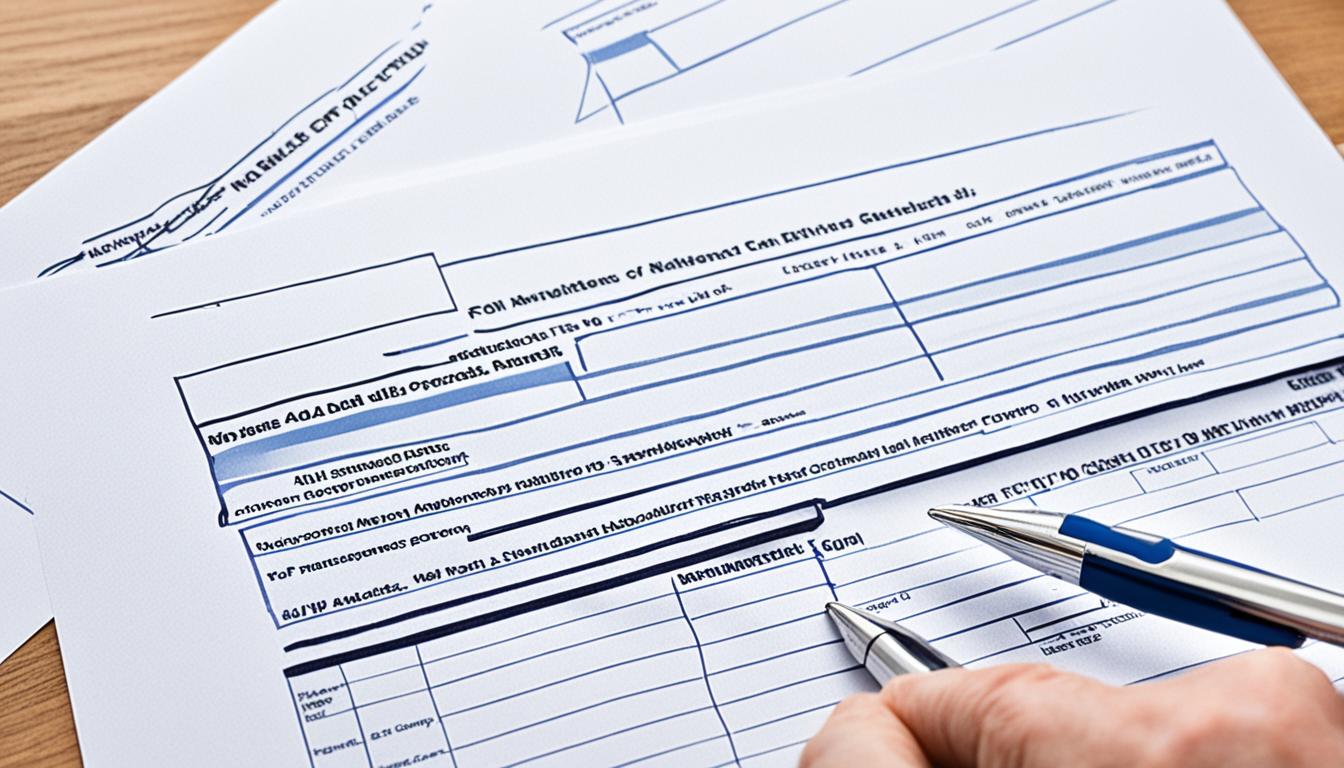Embarking on a move to a fresh state presents both an adventure and a challenge, one that demands prudent legal preparations for a successful relocation. Dotted with excitement, the journey equally entails a myriad of legal things to do when moving to a new state. To ensure you’re not caught off-guard or tangled in unforeseen legal webs, we provide a simplified relocating states legal checklist. This covers everything from compliance with interstate moving regulations to the meticulous transition of your official documents. Navigate these waters wisely by acquainting yourself with essential legal preparations for moving states.
There is much to consider beyond packing boxes and hiring movers; updating your driving credentials, changing your address, and transferring vital records are just a snippet of the legal spectrum you’ll need to cover. Whether it’s a career-driven move or the pursuit of a change in scenery, starting on the right legal footing is non-negotiable.
Key Takeaways
- Compile a relocating states legal checklist to avoid missing key steps.
- Understand and comply with interstate moving regulations to ensure a lawful move.
- Create a solid legal foundation by updating personal documents for the new state.
- Consider the financial aspects by drafting a moving budget tailored to your move.
- Engage with a licensed and insured moving company for secure transportation of your belongings.
- Stay informed about the legal prerequisites for establishing residency in your new state.
Pre-Move Planning: Legal Preparations for a Smooth Transition
Embarking on a move to a new state requires meticulous pre-move planning to mitigate legal hurdles and financial strains. It begins with a clear understanding of interstate moving regulations, extends to the careful creation of a moving budget, and culminates in the pivotal decision of choosing a licensed and insured moving company. This section delves into each of these aspects to ensure that your relocation process is both legislatively sound and fiscally prudent.
Understanding Interstate Moving Regulations
Navigating the network of interstate moving regulations is a fundamental step in ensuring your relocation adheres to legal standards. Such regulations encompass a range of requirements from vehicle standards and transportation of goods to insurance and liability coverages. It is imperative to acquaint oneself with the intricacies of these state and federal laws to steer clear of any non-compliance issues.
Creating a Comprehensive Moving Budget
A meticulous moving budget is indispensable in forecasting the financial requirements of your state-to-state relocation. Anticipating expenses such as packing supplies, moving company fees, insurance, travel costs, and unexpected contingencies helps in averting financial surprises. An in-depth, itemized budget plan serves as a financial blueprint for the move, guaranteeing that every dollar is accounted for.
Selecting a Licensed and Insured Moving Company
Enlisting a licensed and insured moving company is paramount for the protection of your belongings during the transition. It is crucial to verify the licensing credentials to ensure the mover is legally recognized by the appropriate authorities. Moreover, a moving company that is fully insured provides peace of mind by offering recourse in the unlikely event of property damage or loss during the move.
- Research moving companies thoroughly
- Confirm licensing status with the Department of Transportation
- Understanding coverage options for a safeguarded move
Legal Things to Do When Moving to a New State
Embarking on a move to a new state is a venture that requires meticulous planning, especially when it comes to fulfilling your legal obligations. To assist you in navigating these responsibilities, this section provides an organized legal checklist for moving to a new state. It’s vital to comprehend and manage the legal requirements for moving to a new state, as well as to ensure that all necessary legal documents when relocating to a new state are updated and submitted accordingly.

Begin by confirming that you have all required legal documents easily accessible. This typically includes personal identification, such as a driver’s license and Social Security card, as well as other important records like birth certificates and passports. Additionally, compiling medical, academic, and financial documents ahead of time will prevent any undue stress during your state-to-state transition.
| Checklist Item | Details | Notes |
|---|---|---|
| Update Driver’s License | Visit your new state’s DMV within the mandated timeframe | Each state has specific guidelines, usually requiring an update within 30 days |
| Vehicle Registration | Transfer vehicle registration to your new state | Insurance proof may be required; check for any vehicle inspection prerequisites |
| Establish Residency | Understand the requirements to be considered a legal resident for tax purposes | May affect state income tax, voting, and in some cases, tuition rates at state colleges |
| Register to Vote | Update your voter’s registration to your new address | Check the deadline to ensure eligibility for upcoming elections |
| Alert Employers | Inform current or prospective employers of your change of address | This is critical for correct tax withholds and employment records |
Securing housing, whether you’re buying or renting, typically entails submitting an application and providing proof of income and a credit report. You’ll also need to adhere to the legal requirements for moving to a new state regarding utility set-up; contacting local providers for electricity, water, internet, and waste management is a necessity prior to moving in.
- Address Change with USPS
- Alert Financial Institutions
- Update Rental or Homeowner’s Insurance
- Healthcare Enrollment
Moreover, contriving a contingency plan for medical needs during the transition, by requesting a transfer of medical records and potential referrals from your current healthcare provider, aligns with the precautionary tactics that constitute a thorough legal checklist for moving to a new state.
- Transfer Medical Records
- Update Emergency Contact Information
- Refill Prescriptions
To encapsulate, the key to efficiently managing the myriad aspects of shifting your domicile is proactive planning and strict adherence to legal stipulations. By considering these guidelines, you’re well-equipped to commence your journey towards establishing your new home across state lines.
Setting Up Your New Residency: Post-Move Legal Checklist
Relocating brings a slew of essential tasks that are pivotal for a seamless transition into your new life. This entails updating information with official agencies, ensuring your family’s education needs are met, adhering to new state regulations for driving, and maintaining the integrity of your healthcare provisions.
Updating Your Address with USPS and Other Agencies
One of the first steps in updating your address after a move involves notifying the United States Postal Service (USPS). A change of address request ensures your mail follows you to your new home without interruption. It’s equally important to update your address with other agencies, including the IRS, your bank, and credit card companies, to maintain important financial communications.

Transferring School Records and Scheduling New Enrollments
For families with children, transferring school records is a critical step in the relocation process. Contact your child’s current school to arrange the transfer of records to the new school district, and schedule enrollments to minimize educational disruptions. This ensures a smooth academic transition and upholds the continuity of your child’s education.
Vehicle Registration and Driver’s License Changes
When moving states, vehicle registration and updating your driver’s license in accordance with state laws are mandatory tasks. Typically, states have a deadline within which new residents must complete these processes. Check with your new state’s department of motor vehicles (DMV) for specific requirements and timelines.
Ensuring Continuity in Healthcare: Transferring Medical Records
Among the most crucial tasks is transferring medical records when relocating. This involves contacting your current healthcare providers to secure copies of medical records and ensuring their delivery to new healthcare professionals. It’s vital to your family’s well-being that there’s no lapse in medical care due to missing health data.
| Task | Description | Agency/Institution | Deadline |
|---|---|---|---|
| Change of Address | Update contact information for mail delivery. | USPS, IRS, Financial Institutions | ASAP after move |
| School Records Transfer | Move student files to new school district. | Previous and New Schools | Before new school term |
| Vehicle Registration | Register vehicles in new state. | State DMV | Usually within 30-90 days |
| Medical Records Transfer | Ensure continued healthcare. | Healthcare Providers | Prior to new physician appointments |
Navigating Employment and Tax Considerations When Moving Interstate
An interstate move can bring about significant changes in your professional landscape, encompassing both employment considerations when moving states and intricate tax considerations when relocating interstate. Uprooting your life to another state should not only involve physical packing but also meticulous planning to ensure these transitions don’t impede your financial stability and employment continuity. Delving into the realm of tax transitions, one must bear in mind that each state has unique tax codes, and understanding the intricacies of your new home state’s tax laws is paramount.
For those employed, it’s crucial to discuss potential job relocation assistance with your current or future employer. Many companies offer resources and financial support to facilitate the relocation process, understanding the logistics and costs involved. It’s also important to update your employer with your new address and discuss how the move affects your employment terms. A new state may offer fresh job opportunities, but tackling this beforehand can preempt any unforeseen employment hiccups that might arise from state-to-state regulatory contrasts.
When considering the switch, don’t forget to inform the Internal Revenue Service (IRS) and your state’s tax board of your new location. This step is vital as it impacts state income tax filings and could potentially influence your eligibility for certain state-specific tax credits. Failing to update these entities could result in incorrect tax collection or, worse, tax penalties. Thus, while the excitement of a new beginning is alluring, the peace of mind that comes with having all your employment considerations and tax considerations in order is invaluable for a fresh start in your new state.





